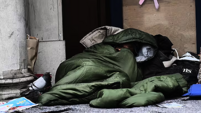John Lannon: EU contributes to causes of migration, then shuts the door on those who flee

Exhausted, uncertain, distressed: This is the reality facing refugees fleeing disasters such as Russia's invasion of Ukraine, including this woman photographed in March 2022. File picture: Paul Zinken/DPA/AP
The Department of Integration is facing huge challenges as it struggles to meet the State’s obligations to international protection applicants and people fleeing the war in Ukraine.
Two years and three months after the Government published its white paper to end direct provision and to establish a new international protection support service, a significant rethink is sorely needed.
















